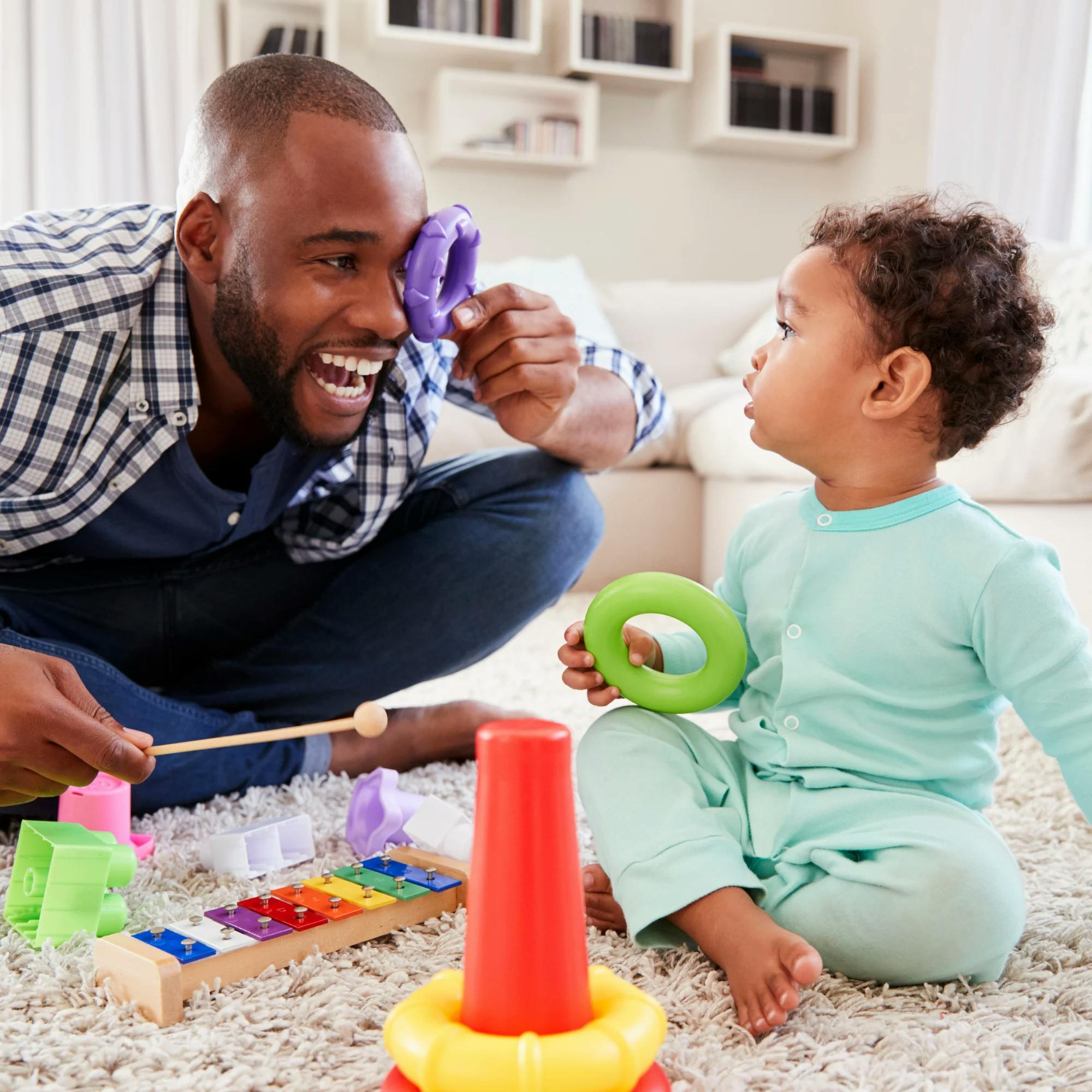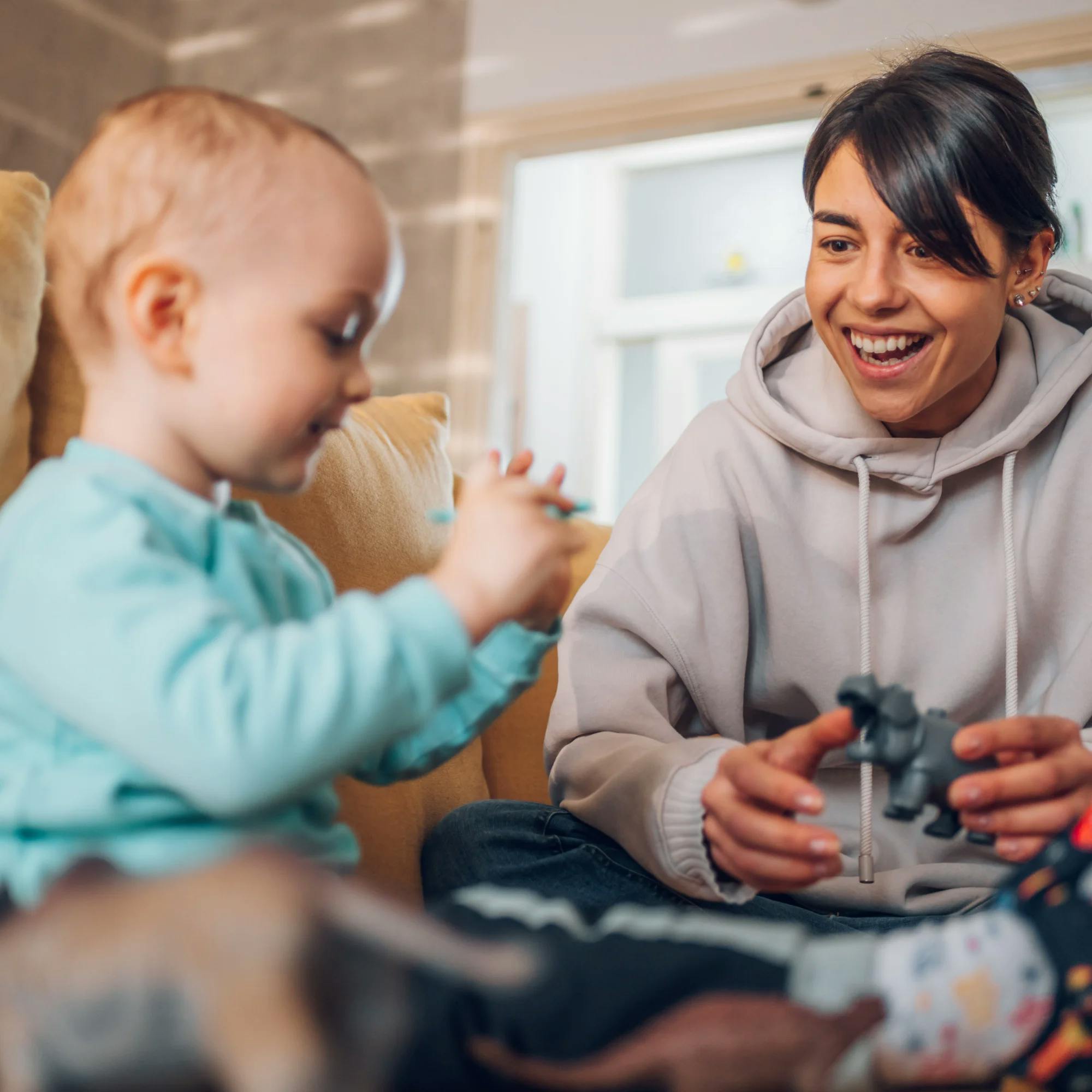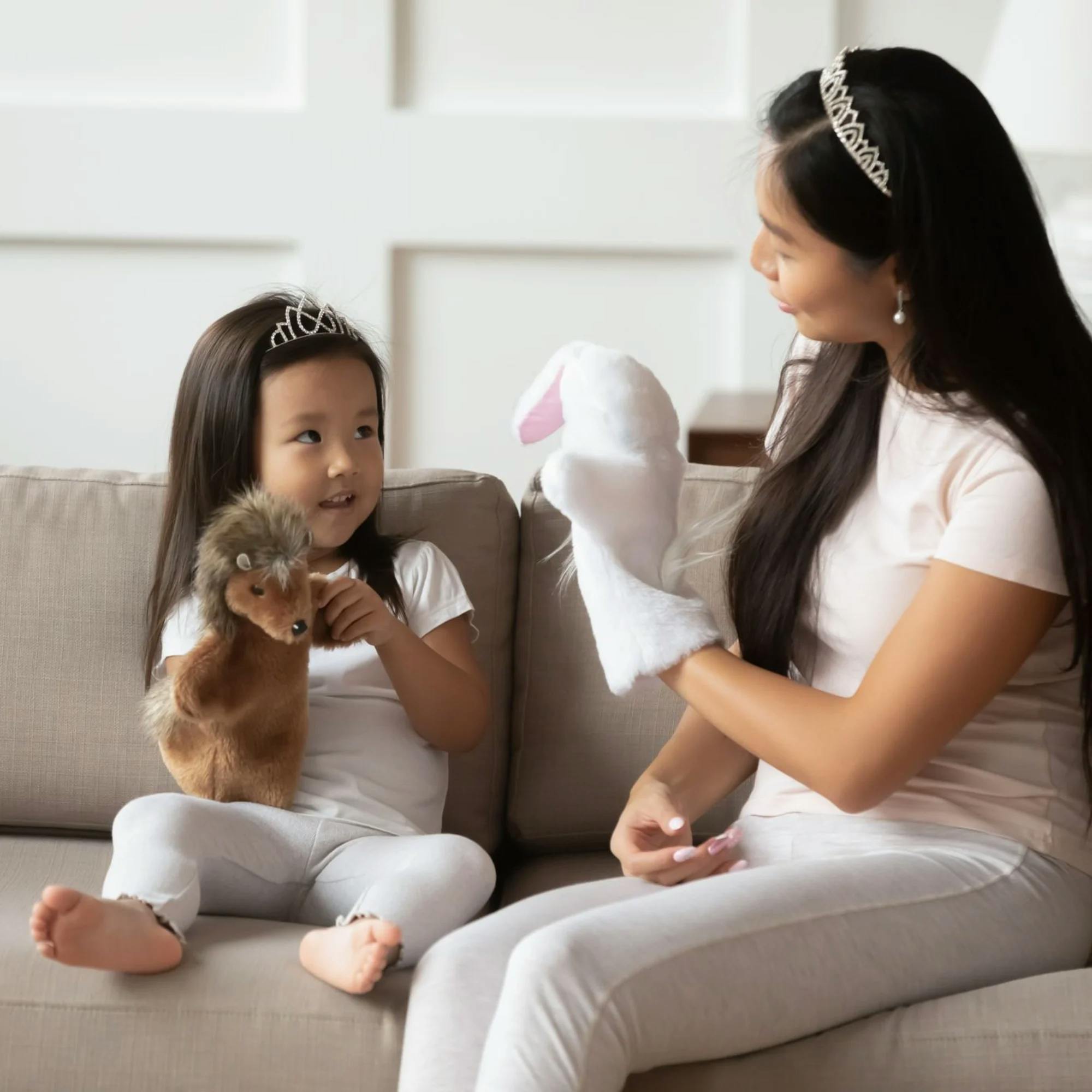Have you been looking forward to the day you can have a real conversation with your toddler? Little talks together are one of the sweetest moments you can share with your child. But the ability to have a back-and-forth conversation doesn’t happen overnight. This skill builds slowly, as children get better at answering “WH questions”–questions that start with what, where, when, why, or who.
In this article, we’re covering everything you need to know about these types of questions, including sample WH questions for kids and how to help your child answer them. You’ll have a little talker on your hands in no time!
Curious or concerned?
Our free screener is tailored by age and covers all areas of speech, language, and feeding. Find out if your child might need speech therapy.
 Screener for children
Screener for childrenWhat are WH questions?
WH questions are questions that start with what, where, when, why, or who. Questions that start with how are also typically included in this group.
As children begin talking more, they learn how to better answer questions. Practicing WH questions helps kids learn to express themselves and join in conversation with others!
Why is it important for kids to be able to answer questions?
A child’s ability to answer WH questions helps them share their thoughts and ideas, explain how they’re feeling, and make conversation with other people. The types of WH questions a child can answer starts out simple, and over time becomes more complex, finally leading to back-and-forth conversation.
The ability to answer WH questions is also important for safety. As parents and caregivers, we hope our child is never hurt or involved in an emergency. But if they are, we want them to be able to explain what happened, especially when they’re asked questions.
What are some typical WH questions for kids?
Let’s look at some examples of WH questions your child may hear throughout the day, either from you or from another caregiver:
What do you want for lunch?
Where are your shoes?
When do we get in the car?
Why are you sad?
Who did you play with?
How was your day?
These questions may seem simple to us. But think about how and why they could be challenging for children who are just learning language. There’s a lot more going on than simply being able to use words to respond. As Alexis Irazoque, M.S., L/SLP, a speech-language pathologist, explains, “To answer a question, kids need to understand what’s been said to them well enough that they can then form an appropriate answer. This requires them to have both receptive language and expressive language skills.”
Receptive language refers to the ability to understand what someone says to us. Expressive language is how we express our wants, needs, and feelings to others, using words, gestures, or facial expressions.


When are children able to answer WH questions?
You may be wondering when kids should be able to answer WH questions. Typically, toddlers will begin answering WH questions around the time they turn 2, sometimes earlier.
In most cases, the questions that they’re asked most often are the ones they’ll be able to answer first. These might be questions like “What’s your name?” or “Who are you talking to on the phone?” (when it’s someone familiar like Grandma!).


How to teach your child to answer WH questions
Let’s discuss a few ways you can practice WH questions with your child at home. Irazoque often recommends this strategy: “One of the easiest ways to teach your child to answer WH questions is by asking the question, then modeling how to answer. So maybe you say, ‘What are you eating for snack? Carrots! You’re eating carrots.’”
You can also ask a “choice question,” where you give your child two possible answers to choose from. You might ask, “Where is your jacket? In your closet or on the couch?” See if your child can answer correctly.
Irazoque adds, “Naturally asking questions related to what you’re doing will help your child learn how to answer these questions more quickly.” So, ask about snacktime while it’s happening, not a few hours later.
Remember, practice is easier when weave it into the everyday routine. So try to ask WHS questions during daily activities like bath time, playtime, while getting your child dressed, or in the car running errands.
Tip: Ask questions with definite answers
In order to monitor how well your child is able to answer these questions, focus on questions that have a definite answer, like the questions above about the snack and the jacket. If you ask questions like “What toy do you want?” or “Where do you want to eat?,” your child may answer easily. And their answer may be correct, but it can be hard to tell what’s actually “correct” in these circumstances, since we can’t know what the child prefers at that exact moment.
So, when you’re practicing, ask questions with clear, definite answers, like “Who’s in this picture?” or “Where is your doll?”
Tip: Ask your child questions that they have the words to answer
Another helpful tip is to ask your child questions that you know they have the vocabulary to answer. The goal over time is that no matter what you ask your child, they either have the words or can find the words to answer. However, in the beginning, they may need some help. If they already have the right words to use, that’s a benefit.
So let’s say you know that your child can tell you they’re wearing their hat or drinking milk. You can ask, “What is on your head?” or “What is in your cup?” You know they can use these words in other situations, so they can likely answer questions that rely on these words as the answer.
Sample WH questions for kids to practice
Here are some examples of questions you can ask your toddler or child as you practice answering questions at home.
“What” questions for kids
What do we drive in? (car)
What do we wear on our feet? (socks, shoes)
What is something we can drink? (milk, water, etc.)
“Where” questions for kids
Where do birds fly? (in the sky)
Where do we eat dinner? (in the kitchen, at the table)
Where does a truck drive? (on a road)
“Who” questions for kids
Who drives a fire truck? (firefighter)
Who flies an airplane? (pilot)
Who takes care of you in the afternoons? (Grandpa)


“When” questions for kids
When do we go to the doctor? (when we’re sick)
When do we eat breakfast? (in the morning)
When do we sleep? (at night, naptime)
“Why” questions for kids
Why do we buckle up in the car? (to be safe)
Why do we brush our teeth? (to keep them clean)
Why do we mow the grass? (so it won’t grow too tall)
“How” questions for kids
How do we make a car go? (drive it, put gas in it)
How do we cut paper (using scissors)
How do you build a tower? (stacking the blocks)

What if your child has a hard time answering questions?
If your child is having difficulty answering WH questions, take a look at other expected speech and language milestones for their age to see if they’re on track:
2-year-old speech and language milestones
3-year-old speech and language milestones
4-year-old speech and language milestones
If your child isn't meeting of their developmental milestones, it's important to contact a speech-language pathologist, also known as a speech therapist. They can evaluate your child and determine if their language growth is on track. Speech therapy may be recommended, both for the ability to answer questions and for other speech and language delays.
To find a speech therapist, talk with your pediatrician, ask family or friends for recommendations, or start with an old-fashioned internet search. You can get matched with an Expressable speech therapist here.
If you’re not sure if your child is on track, it’s important to take the step of talking with a professional. You can gain insight into your child’s growth and make an educated decision on what to do next. If your child needs speech therapy, the sooner they begin, the sooner they’ll start making progress!
Frequently asked questions (FAQs)
What are the types of WH questions?
WH questions are questions that start with what, where, when, why, or who. Questions that start with how are typically included in this group, too.
At what age should a child answer WH questions?
Children should start answering WH questions around the time they turn 2 years old.
What types of WH questions should my child answer?
Kids typically start by answering simpler, more familiar WH questions, such as “What are you eating?” or “Where are you going?” Over time, they can begin answering more difficult WH questions, especially as their vocabulary grows.
How can I practice WH questions for kids?
To help your child practice answering WH questions, ask them straightforward WH questions with a definite answer. Focus on questions that you know they have words to answer with.
When should I be concerned if my child struggles with WH questions?
If your child is 2 years old and isn’t beginning to answer some WH questions, it’s a good idea to contact a speech therapist for an evaluation. You may also want to see a speech therapist if your child isn’t progressing to more complex WH questions as they get older.
Key takeaways
WH questions are ones that start with what, where, when, why, who, and how.
Kids need to know how to answer WH questions in order to express themselves, take part in conversation, and stay safe.
The ability to answer WH questions typically starts at around 2 years old.
There are strategies you can use at home to teach your child to answer WH questions.
If your 2-year-old is having a hard time with these questions, it’s important to see a speech therapist.
How Expressable Can Help
Concerned your child isn't reaching age-expected milestones? Looking for communication support from a professional? Expressable is a national online speech therapy practice serving children and adults. We treat all major areas of communication and feeding, offer flexible hours including evenings and weekends, and accept most major health insurance plans. We’re proud to have earned more than 3,000 5-star reviews from our clients (4.9/5 average).
Our therapy model is centered on parent and caregiver involvement. Research proves that empowering caregivers to participate in their loved one’s therapy leads to better outcomes. That’s why we combine live, 1-on-1 speech therapy with personalized education and home practice activities for faster progress.
Communication is more than words. It’s how we share how we feel and show who we are. We’re here to help you or your child do just that.

 Abby Barnes, M.S., CCC-SLP
Abby Barnes, M.S., CCC-SLP










